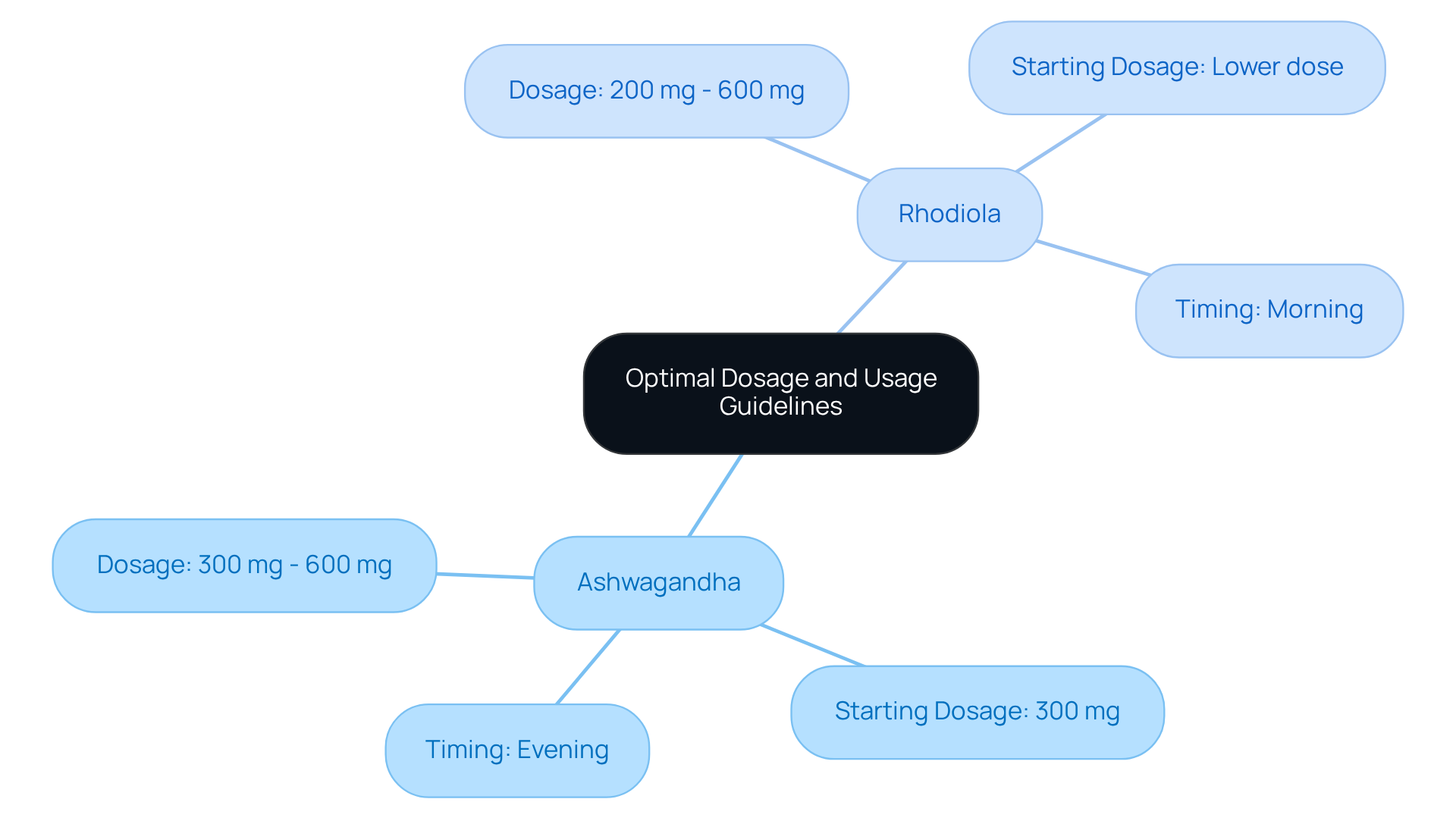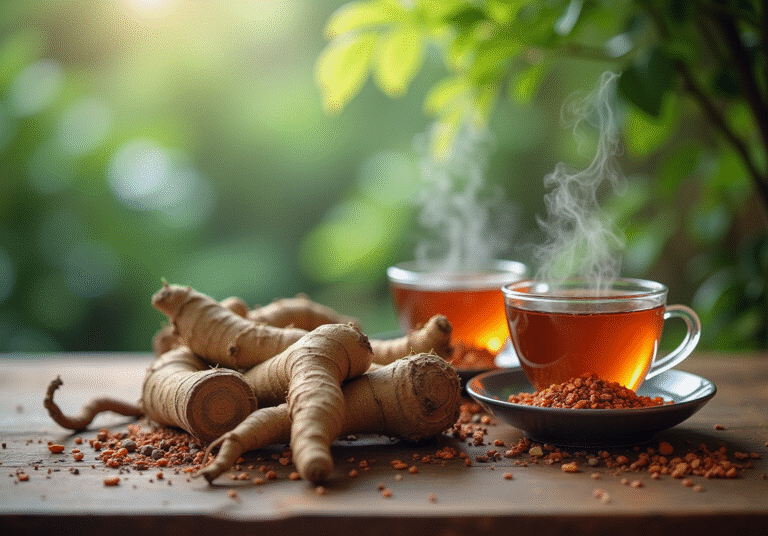Unlock the Benefits of Ashwagandha Combined with Rhodiola
Overview
The combination of ashwagandha and rhodiola unlocks numerous health benefits. These include:
- Stress reduction
- Enhanced energy and focus
- Improved mood
- Better sleep quality
This article supports these claims by detailing how ashwagandha’s calming effects work in tandem with rhodiola’s energizing properties. Together, they promote overall well-being and resilience against stress. As a result, exploring these herbal remedies can lead to significant improvements in mental and physical health.
Introduction
The world of herbal supplements is rich with potent plants celebrated for their health benefits across cultures and centuries. Among these, ashwagandha and rhodiola stand out, not only for their individual properties but also for their remarkable synergy when combined. This article delves into the unique origins and adaptogenic qualities of these herbs, revealing how they work together to enhance stress resilience, boost energy, and improve overall well-being. However, as with any powerful remedy, understanding the proper usage and potential side effects is essential.
How can the harmonious blend of ashwagandha and rhodiola transform health routines while minimizing risks?
Understand Ashwagandha and Rhodiola: Origins and Adaptogenic Properties
Withania somnifera and its counterpart are both esteemed adaptogenic plants with rich histories in traditional medicine.
Origins:
- Ashwagandha: Native to India and North Africa, this herb has been used in Ayurvedic medicine for over 3,000 years, primarily for its stress-relieving properties.
- Rhodiola: Found in cold regions of Europe and Asia, Rhodiola has been utilized in traditional medicine for centuries, particularly in Russia and Scandinavia, to enhance physical and mental performance.
Adaptogenic Properties:
Both herbs are classified as adaptogens, meaning they help the body adapt to stress and promote homeostasis.
- Ashwagandha is known for its calming effects, reducing cortisol levels, and enhancing overall well-being.
- Rhodiola, on the other hand, is recognized for its energizing properties, improving stamina and reducing fatigue.
Understanding these origins and properties is essential for appreciating how ashwagandha combined with rhodiola can synergistically work together to enhance health and vitality.

Explore the Synergistic Benefits of Combining Ashwagandha and Rhodiola
Blending herbal supplements, such as ashwagandha combined with rhodiola, can yield a range of synergistic benefits that enhance both physical and mental well-being.
- Stress Reduction: Both herbs play a role in lowering stress levels. Ashwagandha primarily reduces cortisol, while Rhodiola enhances the body’s resilience to stress.
- Enhanced Energy and Focus: Rhodiola boosts energy and cognitive function, whereas Ashwagandha promotes a sense of calm. The use of ashwagandha combined with rhodiola creates a balanced state of alertness without anxiety.
- Improved Mood: The synergy of these herbs can lead to a better mood and emotional stability. Ashwagandha helps alleviate anxiety, and Rhodiola combats fatigue, contributing to overall emotional health.
- Better Sleep Quality: Ashwagandha’s calming effects can enhance sleep quality. In contrast, Rhodiola’s energy-boosting properties help maintain alertness during the day, leading to a more restful night.
This synergistic relationship makes ashwagandha combined with rhodiola particularly effective for individuals seeking to manage stress while enhancing their overall vitality.

Determine Optimal Dosage and Usage Guidelines for Ashwagandha and Rhodiola
When incorporating ashwagandha combined with rhodiola into your wellness regimen, it is crucial to follow suggested dosages. This practice not only enhances the benefits of ashwagandha combined with rhodiola but also minimizes the potential side effects.
Ashwagandha Dosage:
Typical dosages range from 300 mg to 600 mg of standardized extract per day. For those new to this herb, it is advisable to start with a lower dosage of approximately 300 mg and gradually increase it.
Rhodiola Dosage:
Recommended dosages for Rhodiola generally fall between 200 mg and 600 mg per day, depending on the potency of the extract. As with Ashwagandha, beginning with a lower dose and adjusting according to individual response is suggested.
Timing:
Ashwagandha is often best taken in the evening to promote relaxation, while Rhodiola can be consumed in the morning to boost energy levels throughout the day.
Always consult a healthcare provider before beginning any new supplement regimen, particularly if you have underlying health conditions or are currently taking medications.

Identify Potential Side Effects and Interactions of Ashwagandha and Rhodiola
While herbal remedies are often considered safe for most individuals, it is important to remain aware of potential reactions and interactions.
Ashwagandha Side Effects:
- Common side effects may include gastrointestinal upset, drowsiness, and headaches.
- Rarely, some individuals may experience allergic reactions or more severe gastrointestinal issues.
- A small number of individuals might find that their anxiety increases when consuming this herbal supplement.
- This supplement is contraindicated for individuals diagnosed with cancer, and it may lower blood sugar levels, posing risks for diabetes patients already on medication.
- Excessive use of Ashwagandha has been associated with liver damage in several reported cases from 2021 to 2023.
Rhodiola Side Effects:
- Possible side effects include dizziness, dry mouth, and insomnia.
- Some users may also experience increased irritability or restlessness.
Interactions:
- Both herbs may interact with medications that affect the central nervous system, such as sedatives or antidepressants.
- It is essential to consult a healthcare professional before combining these herbs with other supplements or medications to avoid negative reactions.
- Furthermore, this herb should be avoided during pregnancy and breastfeeding due to unclear implications for the fetus and nursing infant.
Being informed about these potential side effects and interactions can empower readers to make safer choices when incorporating Ashwagandha and Rhodiola into their health routines.

Conclusion
The combination of ashwagandha and rhodiola offers a powerful strategy for enhancing both physical and mental well-being through their unique adaptogenic properties. By exploring the origins and benefits of these herbs, individuals can effectively harness their potential to manage stress, improve mood, and boost energy levels.
Key insights throughout the article highlight the stress-reducing effects of ashwagandha alongside the energizing properties of rhodiola. The synergistic relationship between these two herbs not only fosters emotional stability but also enhances sleep quality and cognitive function. Furthermore, guidance on optimal dosages and potential side effects provides a comprehensive understanding for those considering this herbal combination.
Incorporating ashwagandha and rhodiola into a wellness routine can be a transformative step toward achieving balance and vitality. As awareness of natural remedies continues to grow, individuals are encouraged to further explore these adaptogens and consult healthcare professionals to maximize their benefits safely. Embracing the health advantages of ashwagandha and rhodiola together can lead to a more resilient and energized life.
Frequently Asked Questions
What are Ashwagandha and Rhodiola?
Ashwagandha (Withania somnifera) and Rhodiola are both esteemed adaptogenic plants known for their rich histories in traditional medicine.
Where does Ashwagandha originate from?
Ashwagandha is native to India and North Africa and has been used in Ayurvedic medicine for over 3,000 years.
What is the origin of Rhodiola?
Rhodiola is found in cold regions of Europe and Asia and has been utilized in traditional medicine for centuries, particularly in Russia and Scandinavia.
What are adaptogens?
Adaptogens are substances that help the body adapt to stress and promote homeostasis.
What are the adaptogenic properties of Ashwagandha?
Ashwagandha is known for its calming effects, reducing cortisol levels, and enhancing overall well-being.
How does Rhodiola affect the body?
Rhodiola is recognized for its energizing properties, improving stamina and reducing fatigue.
How can Ashwagandha and Rhodiola work together?
Understanding the origins and properties of both herbs is essential for appreciating how ashwagandha combined with rhodiola can synergistically enhance health and vitality.






